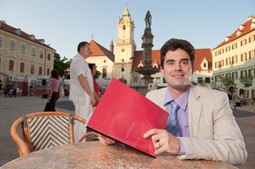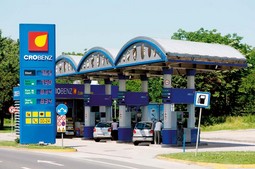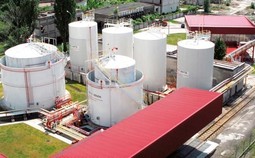Published in Nacional number 764, 2010-07-06
We have the know-how and capital for Crobenz
VIKTOR LEVANIC discusses the intentions of Bratislava-based Slavia Capital to take over INA daughter company Crobenz in spite of the opposition of the Croatian press
 VIKTOR LEVANIC is the vice president of the Slovakian investment fund Slavia Capital responsible for the development of the company's oil businessThe Slovakian investment fund Slavia Capital is one of the three companies that have submitted official bids for the purchase of INA daughter company Crobenz. This is the second attempt to sell the company, owner of 14 petrol service stations, which INA has been told it must sell off by the Croatian Competition Agency if it wishes to merge with Hungary's MOL.
VIKTOR LEVANIC is the vice president of the Slovakian investment fund Slavia Capital responsible for the development of the company's oil businessThe Slovakian investment fund Slavia Capital is one of the three companies that have submitted official bids for the purchase of INA daughter company Crobenz. This is the second attempt to sell the company, owner of 14 petrol service stations, which INA has been told it must sell off by the Croatian Competition Agency if it wishes to merge with Hungary's MOL.
It was in fact Slavia Capital that won the first tender to sell the company - a tender annulled by the competition agency, which said that the Slavia-owned Croatia Petrol Stations, which made the bid for Crobenz, lacked sufficient expert references and financial guarantees to be able to guarantee the development of the company in the future.
And there was speculation in domestic oil industry circles that Slavia Capital was in fact a front for MOL's Slovakian subsidiary Slovnaft, and that it was in fact representing the interests of the Hungarian oil company at the tender. Insofar it was forecast that the Slovakian company, after the negative finding issued by the competition agency, would not appear at the repeated tender for the sale of Crobenz. But the exact opposite happened. Slavia Capital has again, along with Slovenian Petrol and Russian Lukoil, submitted a bid to purchase Crobenz.
Nacional's reporters visited the head office of Slavia Capital, located in a Secession period building in the old town core of Bratislava, and spoke with the company's vice president Viktor Levanic. Levanic, responsible for developing Slavia Capital's oil operations, explained the reasons for the Slovakian company's interest in Crobenz, their plans for the future development of this Croatian company, and denied rumours that his company was little more than a front for one of the big oil companies like Hungary's MOL.
NACIONAL: Slavia Capital has once again appeared at the tender for the sale of Crobenz, even though the Croatian Competition Agency rejected your first round bid because it felt that you lacked the necessary amount of experience in the oil business. Why do you feel that the outcome might be different this time round?
- The agency's decision was, of course, legitimate, but I believe that it was made on the basis of incomplete data. The agency, unfortunately, and much of the Croatian public, did not entirely comprehend the business model through which we embark on new acquisitions by setting up a new company through which we lead the entire process. In the case of Crobenz, this was done through the Croatian Petrol Stations company, and it is therefore logical that it could not have had any business experience or long term financial indicators, but other companies operating within the Slavia Capital Group have all of the necessary references. Insofar it was quite strange to read the allegations of some of the Croatian media that claim that we are some kind of unknown fund, lacking transparency and with unclear intentions. The truth is quite the opposite. Slavia Capital is the leading Slovakian investment group, and over the past fifteen years we have participated in all major privatisation processes in Slovakia, with a total value in excess of 3 billion euro. We have participated in some of the most significant transactions, such as the sale of the Slovakian telecom company to Deutsche Telekom, and the privatisation of Transpetrol, the national oil pipeline system operator sold in 2002 to the Russian oil company Jukos. We cooperate with a great many respected financial institutions in Southeastern Europe and have excellent references.
NACIONAL: Nevertheless, the Croatian public perceives your company more as a financial investor, and not as a company from the oil industry sector with the experience and knowledge required to further develop the operations of Crobenz.
- That is an entirely erroneous perception. We have worked for years as advisors on projects involving major oil and energy companies such as OMV, Jukos and RWE Gas. Through these jobs we have gained significant knowledge - knowledge we have decided to apply in our own investments, and the lion's share of our portfolio is dedicated to precisely these kinds of companies. The key company in this segment is Progres Trading, which we purchased in 2006 and have succeeded in just a few years in transforming into one of the most successful companies on the oil and oil derivatives wholesale market in Slovakia, the Czech Republic and Poland. We have invested heavily in modernising operations and in building new storage capacities, and developed an innovative business model. Besides Progres Trading, we are also owners of the Palma Group and Agropodnik, two major Slovakian and Czech biodiesel production companies. Insofar the possibility of expanding operations into new markets in the region is logical, and Croatia and Crobenz are very interesting to us in that context. We have, therefore, sufficient experience to give a realistic appraisal of the value of a company like Crobenz, the know-how to develop the company, and the capital to finance this development.
NACIONAL: How would this development look? THE RACE FOR CROBENZ Out to purchase INA's daughter company, which owns 14 retail petrol stations, besides Slavia Capital, are Slovenia's Petrol and Russia's Lukoil- A significant part of Crobenz's operations focus on wholesale, and here we are certain that we can in a very short period of time become one of the three largest companies in Croatia in this market segment. This development should be based on the commission sale of fuel, a business model we developed in Slovakia. What we do is offer the owners of individual privately owned petrol filling stations our products on commission, and in that way they do not require capital to purchase oil, that is to say their operational risk practically disappears. We believe that this business model could become very successful in Croatia, especially considering the negative effects of the economic crisis. On the other hand, as far as the retail chain is concerned, we hope to increase it by some 10 petrol stations by the end of 2011, perhaps more depending on the situation on the market. All in all, it is our intention to compete with all existing players on the Croatian market, that is to say that we wish to raise the stakes in market competition. We hope that the Croatian Competition Agency will also recognise our intentions as such.
THE RACE FOR CROBENZ Out to purchase INA's daughter company, which owns 14 retail petrol stations, besides Slavia Capital, are Slovenia's Petrol and Russia's Lukoil- A significant part of Crobenz's operations focus on wholesale, and here we are certain that we can in a very short period of time become one of the three largest companies in Croatia in this market segment. This development should be based on the commission sale of fuel, a business model we developed in Slovakia. What we do is offer the owners of individual privately owned petrol filling stations our products on commission, and in that way they do not require capital to purchase oil, that is to say their operational risk practically disappears. We believe that this business model could become very successful in Croatia, especially considering the negative effects of the economic crisis. On the other hand, as far as the retail chain is concerned, we hope to increase it by some 10 petrol stations by the end of 2011, perhaps more depending on the situation on the market. All in all, it is our intention to compete with all existing players on the Croatian market, that is to say that we wish to raise the stakes in market competition. We hope that the Croatian Competition Agency will also recognise our intentions as such.
NACIONAL: You say you wish to raise the level of market competition, but there are rumours in Croatia that you will in fact do the exact opposite, and that your company is no more than a front for the Slovakian oil company Slovnaft, which is owned by MOL. What is the nature of your business relations with Slovnaft and MOL?
- These rumours have also reached us, but they are not correct. What is more, our Progres Trading is the chief wholesale market competitor to Slovnaft, and we have taken over 10 percent of their market share over the past two years. On the other hand, in the process of the privatisation of Slovnaft in 2000 we represented MOL's competitor, Austrian-based OMV, while it was in fact Slovnaft that was the chief competitor to "our" Jukos in the process of the sale of Transpetrol. In several other major transactions we have been on the other side of the fence from both Slovnaft and MOL, so it is unclear to me were the rumour that we in fact represent them could have emerged from. Obviously we are acquainted with our colleagues in these companies and that we maintain business communications, but that is where it ends. We are out to buy Crobenz for ourselves, and we see potential in the company and the opportunity to increase its market value and thereby earn profits. But that is possible only by fighting it out on the market with MOL, INA and the other companies out there.
NACIONAL: How do you plan to cover Crobenz's debts, which the Croatia press says are significant?
- I am not, because of the provisions of the tender, in a position to discuss the current situation in Crobenz, but I can say in principle that we will not finance the development of the company, at least in the first phase, from debt, but rather exclusively from our own capital, i.e. the capital of our investors. Our business policy is such that we create a separate investor consortium for every deal, and in the case of Crobenz this includes a number of private and institutional Slovakian investors, who believe based on previous experience that we will again earn profits on this deal. We carefully monitor all major undertakings in the energy sector in the region, and as such attentively monitored the second phase of the integration of INA and MOL, knowing that in these kinds of operations there are usually sales of some of the assets. Which did in fact take place - but we were surprised by the media interest for the entire process of the sale of Crobenz. This is not a large company, it owns only 14 retail petrol filling stations and the sale of this kind of company in Slovakia would have only received cursory media attention. We did, however, only later realise that the interest of the Croatian public for the sale of Crobenz was due to the fact that it is linked to the INA-MOL merger.
Diverse investments
NACIONAL: What other sectors, besides energy and food production, is Slavia Capital investing in?
 PROGRES TRADING, a company owned by Slavia Capital, has been one of the most successful in the wholesaling of oil derivatives in the region since 2006We are investing in various activities, from heavy industry to banking. We have, for example, previously held a majority stake in the large Slovakian copper wire producer Kovohutny, the telecommunication company ViaPVT, and stakes in several financial institutions in the region, such as the Macedonian Investbank. We are currently the owners of Way Industries, very successful in the manufacture of excavators and demining machines, and of the Primrose company, which holds patented technology for the manufacture of plant extracts, and we are co-owners of the Piper light aircraft factory in the Czech Republic.
PROGRES TRADING, a company owned by Slavia Capital, has been one of the most successful in the wholesaling of oil derivatives in the region since 2006We are investing in various activities, from heavy industry to banking. We have, for example, previously held a majority stake in the large Slovakian copper wire producer Kovohutny, the telecommunication company ViaPVT, and stakes in several financial institutions in the region, such as the Macedonian Investbank. We are currently the owners of Way Industries, very successful in the manufacture of excavators and demining machines, and of the Primrose company, which holds patented technology for the manufacture of plant extracts, and we are co-owners of the Piper light aircraft factory in the Czech Republic.
NACIONAL: Over the past few years Slavia Capital has invested in most of the countries of South Eastern Europe, such as Hungary, Serbia, Bulgaria, Macedonia and Romania, but the bid for Crobenz is your first essay into Croatia. Why?
- Croatia has, along with Slovenia, for years been the most interesting of the former Yugoslav member states for investors. That means that the competition for possible investment into Croatia has been significantly greater than in Serbia or Macedonia, and greater competition in the final tally means higher prices. It is normal that for us as investors it is in our interest to pay as little as possible for companies we feel have value, and that was much easier in neighbouring countries than in Croatia. There have, in fact, been many Slovakian investors in Croatia over the years, and every such successful deal is a kind of invitation for other Slovakian companies to invest in Croatia. I sincerely hope that this scenario will be repeated in the case of Crobenz.
Latest news
-
28.10.2010. / 14:15
'A profitable INA is in everyone's interest'
-
28.10.2010. / 09:38
Sanader’s eight fear SDP — Won’t bring down Government
-
21.10.2010. / 15:02
Interior Ministry turned a blind eye on Pukanic assassination
-
20.10.2010. / 09:34
Barisic could bankrupt HDZ



